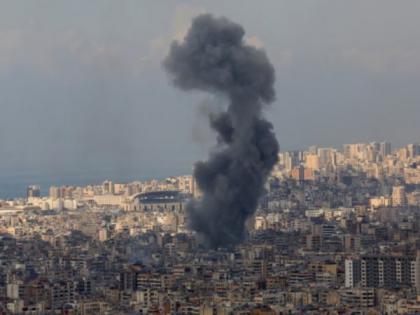IDF continues strikes on Hezbollah despite ceasefire
By ANI | Updated: July 29, 2025 23:59 IST2025-07-29T23:54:45+5:302025-07-29T23:59:39+5:30
Tel Aviv [Israel], July 29 : The Israeli Defense Forces have said they will persist with targeted strikes against ...

IDF continues strikes on Hezbollah despite ceasefire
Tel Aviv [Israel], July 29 : The Israeli Defense Forces have said they will persist with targeted strikes against Hezbollah in Lebanon despite the November 2024 ceasefire. The IDF said it aimed to push for the group's full disarmamenteven at the risk of triggering another war, The Jerusalem Post reported.
According to the IDF, Hezbollah's military capabilities have been significantly degraded, particularly its ability to launch large-scale rocket attacks on Israel. Pre-war, Hezbollah possessed an estimated 150,000 rockets and tens of thousands of launchers. However, The Jerusalem Post noted that the number of launchers is now down to only a couple of thousand, and the overall rocket arsenal has decreased by 70-80%.
This depletion translates into a dramatic drop in firing capacityfrom 1,500 rockets at once to merely dozens. "Hezbollah also has lost virtually all of its multiple rocket launching platforms," IDF officials stated, as cited by The Jerusalem Post.
The Jerusalem Post further reported that the IDF believes Hezbollah's operational flexibility has been drastically curtailed. The group is now limited to individual launchers, rendering each attack more exposed and risk-prone. While Hezbollah retains a few long-range precision rockets, its ability to deploy them is hampered by IDF control over key launching zones, many of which have already been struck.
Hezbollah's traditional weapon smuggling route through Syria has also been disrupted. The new Sunni regime in Syria is independently blocking most of Iran's smuggling operations into Lebanon to limit the spread of Shiite influence, a shift that has "hit the group hard," according to The Jerusalem Post.
To assess ongoing threats, the IDF has carried out up to five strikes on cross-border positions between Syria and Lebanon. While the IDF sees Hezbollah's top leadership as currently deterred, they remain wary of Iran's continued financial supportreportedly around USD 1 billion annuallycompared to the West's USD 250 million in assistance to Lebanon.
Since the ceasefire, the IDF has conducted over 500 attacks on Hezbollah targets. These include 230 killings of Hezbollah operatives, 90 rocket launcher strikes, 20 attacks on bases or outposts, 40 hits on weapons storage facilities, and three targeted operations on the elite Radwan special forces training camps, The Jerusalem Post confirmed.
Cumulatively, Israeli intelligence estimates that 4,000-5,000 Hezbollah fighters have been killed and approximately 9,000 permanently incapacitated, removing over half of Hezbollah's standing army of 25,000 from the battlefield.
"Hezbollah was also said to have tens of thousands more reservist fighters, but IDF sources estimate that only 10% of them are still active now," the report said. The elite Radwan force has been reduced from 6,000 fighters to between 2,500-3,000 and has shifted its focus to internal security.
The IDF said that at present, there is no threat of a large-scale Hezbollah invasion, as the group is being kept far from Israel's northern border. While the possibility of small, isolated attacks remains, "the scenario of 6,000 Radwan invaders striking Israel all over the north simultaneously is not and will not be a threat for some time to come," it noted.
Praising the role of the United States in managing ceasefire violations, the IDF contrasted the current dispute resolution mechanism with pre-war UNIFIL efforts. The IDF has submitted 1,263 Hezbollah violations, of which 456 were handled internally, and 666 were forwarded to the Lebanese army, which resolved 82% of them effectively.
The Jerusalem Post reported that the IDF credits the US with assisting the Lebanese army in clamping down on Hezbollah's breaches. Nevertheless, the IDF continues to take unilateral action when necessary, especially in cases involving multiple-layered violations.
Disclaimer: This post has been auto-published from an agency feed without any modifications to the text and has not been reviewed by an editor
Open in app